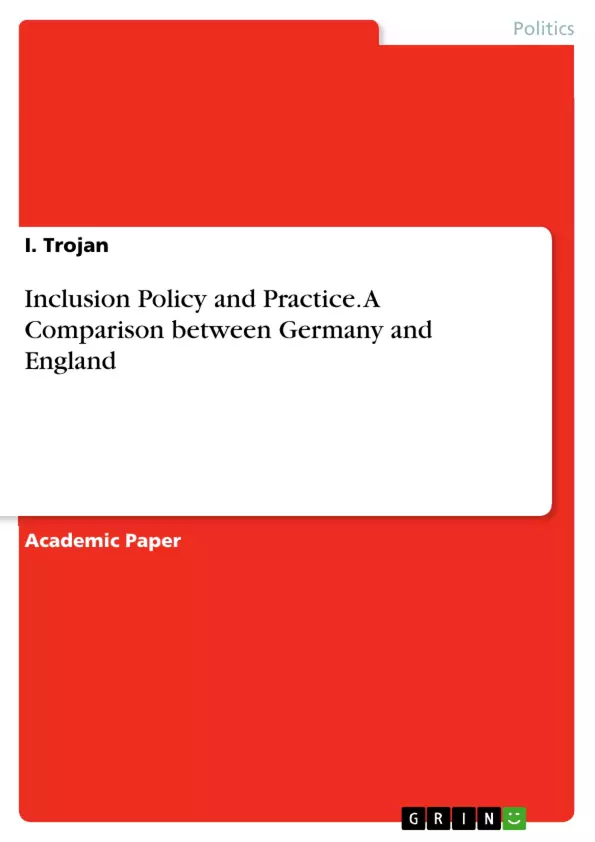This paper will provide a comparative review regarding some aspects in inclusion policy and practice between Germany and England. The purpose of this paper is to highlight the differences among both countries, regarding their inclusion-policies, and to derive conclusions about what can be improved in either one. As a side effect of globalization, comparative education gains importance in the countries´ achievement to compete with one another on a global scale. It promotes the critical engagement with education systems without judgement or prejudice, while fostering an awareness of economic and political circumstances. Not being just an academic practice, it can be of use to improve education around the globe. One of the biggest uncertainties in the field of comparative education, are the different ways in which inclusion is defined and understood by different countries. Since the creation of the Salamanca Statement in 1994, 92 governments and 25 international organizations made a commitment to abolish segregated education and to enable children with disabilities to be part of the mainstream school-system. It is one of the most significant documents in that domain and provides the framework about how to realize the settled arrangements for all governments.
Inhaltsverzeichnis (Table of Contents)
- INTRODUCTION.
- DEFINING SEN.
- ASSESSMENT OF SEN
- ASSESSMENT OF SEN IN ENGLAND
- ASSESSMENT OF SEN IN GERMANY
- DATA ON INCLUSION IN EUROPE.
- CROSS-COUNTRY REPORT..
- SEN AND IMMIGRATION
- SEN AND IMMIGRATION IN ENGLAND..
- SEN AND IMMIGRATION IN GERMANY.
- TEACHER EDUCATION.
- TEACHER EDUCATION IN ENGLAND....
- TEACHER EDUCATION IN GERMANY
- CONCLUSION.
Zielsetzung und Themenschwerpunkte (Objectives and Key Themes)
This paper provides a comparative review of inclusion policy and practice in Germany and England. The aim is to highlight the differences between the two countries in terms of their inclusion policies and to draw conclusions about potential areas for improvement in both systems. Comparative education is increasingly important in today's globalized world, promoting critical engagement with education systems while fostering awareness of economic and political circumstances.
- Defining inclusion and special educational needs (SEN) in both countries
- Comparing the assessment of SEN in England and Germany
- Analyzing data on inclusion in Europe, focusing on cross-country reports and the impact of immigration on SEN
- Examining teacher education practices in both countries
- Identifying areas for improvement and potential synergies in inclusion policies and practices
Zusammenfassung der Kapitel (Chapter Summaries)
- Introduction: This chapter introduces the paper's objectives and the importance of comparative education in understanding and improving inclusion practices. It also discusses the Salamanca Statement and its impact on international inclusion policies.
- Defining SEN: This chapter explores the difficulties in defining and interpreting "inclusion" in both England and Germany, highlighting the diverse perspectives and challenges in implementing inclusive education policies.
- Assessment of SEN: This chapter delves into the specific assessment procedures for SEN in both England and Germany, contrasting the approaches and highlighting potential areas of divergence and convergence.
- Data on Inclusion in Europe: This chapter examines relevant cross-country data on inclusion and analyzes the impact of immigration on SEN in both countries.
- Teacher Education: This chapter provides an overview of teacher education programs in both England and Germany, exploring their focus on inclusion and the preparation of teachers to work with diverse learners.
Schlüsselwörter (Keywords)
This paper focuses on key concepts such as inclusion, special educational needs (SEN), comparative education, immigration, assessment, teacher education, and the Salamanca Statement. It also explores the unique challenges and opportunities associated with implementing inclusive education policies in both England and Germany.
Frequently Asked Questions
What is the main objective of this comparative review?
The paper aims to highlight the differences in inclusion policy and practice between Germany and England to identify potential improvements for both systems.
What role does the Salamanca Statement play in inclusion policy?
Created in 1994, it provides the international framework for abolishing segregated education and enabling children with disabilities to join mainstream schools.
How do Germany and England differ in their definition of SEN?
Both countries have diverse ways of defining and understanding "inclusion" and Special Educational Needs (SEN), leading to different assessment procedures.
How does immigration impact SEN in both countries?
The paper analyzes data on how immigration correlates with the identification and support of children with special educational needs in both nations.
What are the differences in teacher education regarding inclusion?
The study examines how teachers in England and Germany are prepared to work with diverse learners and the specific focus of their respective training programs.
Why is comparative education important in a globalized world?
It promotes critical engagement with education systems without prejudice, fostering awareness of economic and political circumstances to improve global education.
- Quote paper
- I. Trojan (Author), 2023, Inclusion Policy and Practice. A Comparison between Germany and England, Munich, GRIN Verlag, https://www.grin.com/document/1324541



